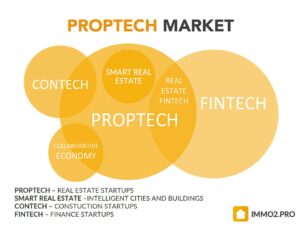The revolution is coming: the future of PropTech
The property market has not gone digital at same rate as other sectors, like shopping and taxis. This is visibly demonstrated by the state of estate agents, where it is still clearly the land of fax-machines, whiteboards and post-dated cheques. Where there are landed assets to maintain, investing in the future digital direction of the business does not seem to be near the top of the average estate agent or property manager’s list of priorities. With tech giants utilising emerging technology to serve unmet customer needs, the need for the property industry to step up its tech are real.

As the number of renters grows, so does their influence and their experience of how technology improves their lives. On the whole, technology has changed what consumers expect from the services they use, from the availability of real-time information to the self-management of issues. Therefore, demand for an increasingly forward-thinking property and rental sector is growing from those who use and rely on it the most.
So, why has the tech revolution of the property sector taken so long? The heavy regulation of the sector counts for one, but the same can be said for the heavily regulated financial sector. As an asset-class based business, landlords and developers tend to see assets as their primary investment focus, leaving tech overlooked. Property is also a fast-moving industry, with businesses perhaps not having the time or financial backing to schedule in the shift to digital. But consumer demand and the increasing popularity of online estate agents, like PurpleBricks, will force property businesses to take the no-longer-optional steps to digital.
Investment in technology will not only benefit renters, but will provide tangible benefits to property agents themselves. It will enable them to speed up and digitalise the more mundane aspects of the job, and spend more time focusing on customer satisfaction, something of increasing importance to millennial consumers, and in a world where online reviews are easy to find and leave.
The digital technology sector is growing three times faster than the rest of the UK economy, and added £14bn to the economy last year. Globally, $9.6bn was invested into property tech, with $177m and $129m invested in UK firms PurpleBricks and Nested. Whilst this is down from the $12.6bn invested in 2017, 509 companies were invested in, compared to 347. It’s also a huge leap from the $4bn invested in property tech in 2016, and the $33m invested in 2010. The British government has been urged to create a coherent PropTech strategy by the sector, and the British Property Federation has published a report into the potential of technology to revolutionise the sector.
Technology is not just impacting the way people rent and buy properties. There is a drive towards smart buildings in cities in both the commercial and residential space, encompassing co-working, co-living and flexible rental/ownership arrangements. Smart tech supports the efficient and sustainable use of buildings, and also enables space to be used in new ways. Airbnb has driven a huge change to the holiday rental sector, and is facing pushback from companies and cities including Barcelona, Berlin and its home city San Francisco, which Airbnb has actually sued. The likes of Airbnb have driven other start-ups, like Hostmaker, Guesty and Proprly, to which AI and machine learning elements are being introduced to improve the experience of users and managers. Even Alexa has a property valuation tool, handing more control and information to owners and landlords.

Next steps in the property industry also revolve around big data. Traditionally, property data has been rather messy, with platforms relying on researchers, and property data listings often not being updated after the sale closed. Now, machine learning developments have standardised and improved data aggregation and analysis, and large businesses are acknowledging the mutual benefits of sharing data with each other. This has benefited long-established businesses like Estates Gazette (through Radius Data Exchange) as well as newcomers like HouseCanary in the residential space.
Emerging technology and an increased awareness of consumer demands are pushing the property sector to digitalise and revolutionise its approach to letting and selling. The changes that PropTech has already made to building management, mortgage providers and estate agents will continue to revolutionise the commercial and residential property market in years to come.
Josephine Kemp
josephine@trippassociates.co.uk
Martin Tripp Associates is a London-based executive search consultancy. While we are best-known for our work across the media, information, technology, communications and entertainment sectors, we have also worked with some of the world’s biggest brands on challenging senior positions. Feel free to contact us to discuss any of the issues raised in this blog.